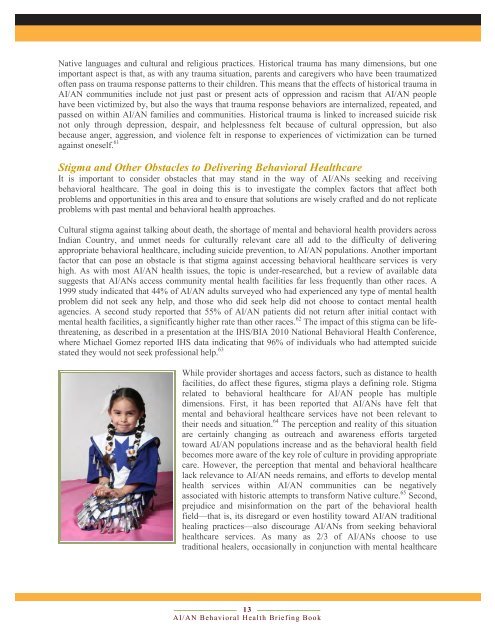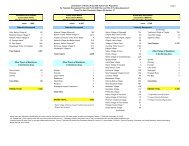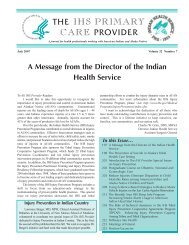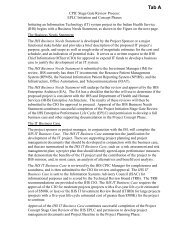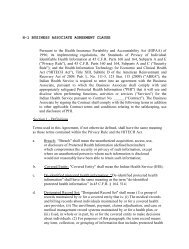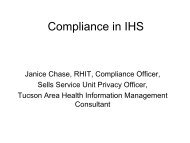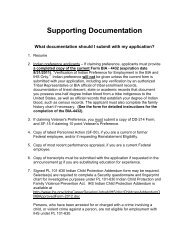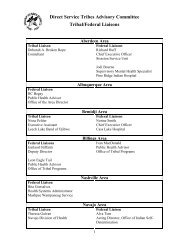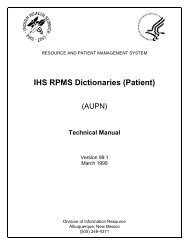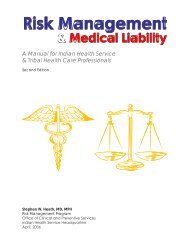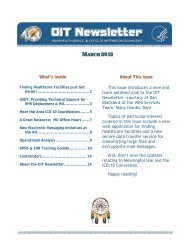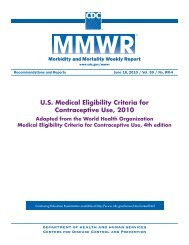American Indian/Alaska Native Behavioral Health Briefing Book
American Indian/Alaska Native Behavioral Health Briefing Book
American Indian/Alaska Native Behavioral Health Briefing Book
You also want an ePaper? Increase the reach of your titles
YUMPU automatically turns print PDFs into web optimized ePapers that Google loves.
<strong>Native</strong> languages and cultural and religious practices. Historical trauma has many dimensions, but one<br />
important aspect is that, as with any trauma situation, parents and caregivers who have been traumatized<br />
often pass on trauma response patterns to their children. This means that the effects of historical trauma in<br />
AI/AN communities include not just past or present acts of oppression and racism that AI/AN people<br />
have been victimized by, but also the ways that trauma response behaviors are internalized, repeated, and<br />
passed on within AI/AN families and communities. Historical trauma is linked to increased suicide risk<br />
not only through depression, despair, and helplessness felt because of cultural oppression, but also<br />
because anger, aggression, and violence felt in response to experiences of victimization can be turned<br />
against oneself. 61<br />
Stigma and Other Obstacles to Delivering <strong>Behavioral</strong> <strong>Health</strong>care<br />
It is important to consider obstacles that may stand in the way of AI/ANs seeking and receiving<br />
behavioral healthcare. The goal in doing this is to investigate the complex factors that affect both<br />
problems and opportunities in this area and to ensure that solutions are wisely crafted and do not replicate<br />
problems with past mental and behavioral health approaches.<br />
Cultural stigma against talking about death, the shortage of mental and behavioral health providers across<br />
<strong>Indian</strong> Country, and unmet needs for culturally relevant care all add to the difficulty of delivering<br />
appropriate behavioral healthcare, including suicide prevention, to AI/AN populations. Another important<br />
factor that can pose an obstacle is that stigma against accessing behavioral healthcare services is very<br />
high. As with most AI/AN health issues, the topic is under-researched, but a review of available data<br />
suggests that AI/ANs access community mental health facilities far less frequently than other races. A<br />
1999 study indicated that 44% of AI/AN adults surveyed who had experienced any type of mental health<br />
problem did not seek any help, and those who did seek help did not choose to contact mental health<br />
agencies. A second study reported that 55% of AI/AN patients did not return after initial contact with<br />
mental health facilities, a significantly higher rate than other races. 62 The impact of this stigma can be lifethreatening,<br />
as described in a presentation at the IHS/BIA 2010 National <strong>Behavioral</strong> <strong>Health</strong> Conference,<br />
where Michael Gomez reported IHS data indicating that 96% of individuals who had attempted suicide<br />
stated they would not seek professional help. 63<br />
While provider shortages and access factors, such as distance to health<br />
facilities, do affect these figures, stigma plays a defining role. Stigma<br />
related to behavioral healthcare for AI/AN people has multiple<br />
dimensions. First, it has been reported that AI/ANs have felt that<br />
mental and behavioral healthcare services have not been relevant to<br />
their needs and situation. 64 The perception and reality of this situation<br />
are certainly changing as outreach and awareness efforts targeted<br />
toward AI/AN populations increase and as the behavioral health field<br />
becomes more aware of the key role of culture in providing appropriate<br />
care. However, the perception that mental and behavioral healthcare<br />
lack relevance to AI/AN needs remains, and efforts to develop mental<br />
health services within AI/AN communities can be negatively<br />
associated with historic attempts to transform <strong>Native</strong> culture. 65 Second,<br />
prejudice and misinformation on the part of the behavioral health<br />
field—that is, its disregard or even hostility toward AI/AN traditional<br />
healing practices—also discourage AI/ANs from seeking behavioral<br />
healthcare services. As many as 2/3 of AI/ANs choose to use<br />
traditional healers, occasionally in conjunction with mental healthcare<br />
13<br />
AI/AN Beh avioral <strong>Health</strong> Briefin g Boo k


